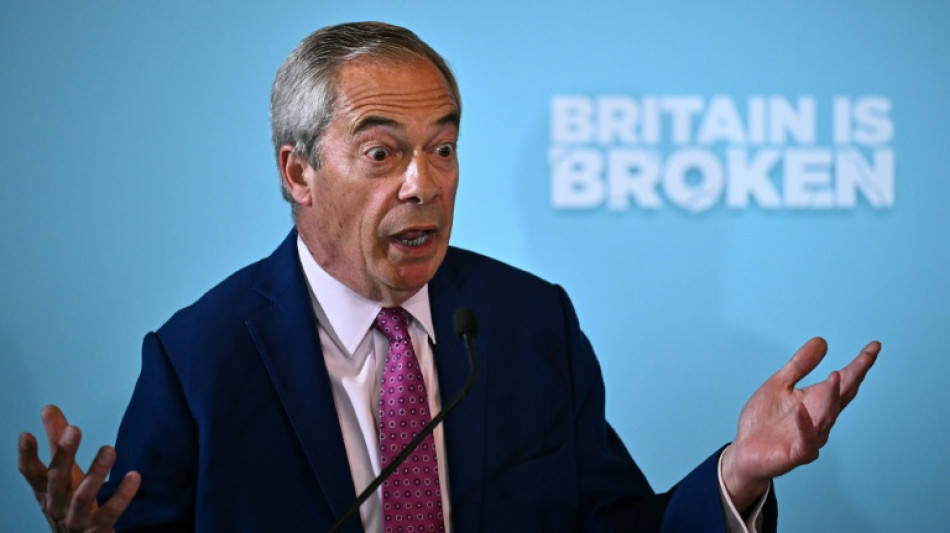
| CMSC | 0.54% | 22.15 | $ | |
| SCS | 2.76% | 10.15 | $ | |
| BCC | 3.25% | 95.82 | $ | |
| RIO | 2.11% | 59.815 | $ | |
| RBGPF | 6.26% | 67.21 | $ | |
| CMSD | 0.22% | 22.31 | $ | |
| BCE | -1.16% | 21.195 | $ | |
| JRI | -0.08% | 13 | $ | |
| RYCEF | 1.26% | 10.35 | $ | |
| NGG | -0.15% | 71.545 | $ | |
| AZN | 2.44% | 72.275 | $ | |
| RELX | 1.57% | 54.94 | $ | |
| GSK | 0.18% | 38.82 | $ | |
| BTI | -0.52% | 43.075 | $ | |
| VOD | -0.78% | 9.655 | $ | |
| BP | 0.53% | 28.029 | $ |

Hard right makes early gains as local polls test UK's main parties
Britain's hard-right Reform UK party made early gains Friday as results trickled in from local elections that were expected to deliver a bruising for the country's two establishment parties.
Reform, led by anti-immigrant firebrand Nigel Farage, picked up dozens of council seats from both Labour and the Conservatives as Britain's political landscape shows signs of splintering.
"We have fought a strong campaign. The two major parties are more fearful of the results tonight than we are," said Farage, adding his intention was to "smash the two-party system".
The polls in England are the first since Keir Starmer became Labour prime minister and Kemi Badenoch took over the reins of the struggling opposition Conservatives last year.
Just 1,641 seats across local authorities are up for grabs -- only a fraction of England's 17,000 councillors -- but the polls were expected to confirm a trend that Britain is entering an era of multi-party politics.
The centrist Liberal Democrats and left-wing Greens were also expected to make gains as surveys show Britons are increasingly disillusioned with the two main parties amid anaemic economic growth, high levels of irregular immigration and flagging public services.
Six mayoral posts were also being contested, as was a parliamentary seat in the northwest English area of Runcorn and Helsby, which went to a recount after Reform led Labour by just four votes.
Labour only narrowly held the North Tyneside mayoralty after a 26-percent swing to Reform while the BBC projected that the hard-right upstarts would win the Greater Lincolnshire mayoralty.
Reform, which has vowed to "stop the boats" of irregular migrants crossing the English Channel, is hoping that winning mayoralties and gaining hundreds of councillors will help it build its grassroots activism before the next general election -- likely in 2029.
- Squeezed from both sides -
British politics have been dominated by the centre-left Labour party and centre-right Tories since the early 20th century.
But "British politics appears to be fragmenting," political scientist John Curtice wrote in the Telegraph this week.
He said Thursday's polls "will likely be the first in which as many as five parties are serious players".
Labour won a huge parliamentary majority in July with just 33.7 percent of the vote, the lowest share for any party winning a general election since World War II.
The Conservatives won just 24 percent of the vote, securing only 121 seats in the 650-seat parliament as the party endured its worst election defeat.
Reform picked up five seats, an unprecedented haul for a British hard-right party, while the Liberal Democrats won 61 more MPs than at the previous election and the Greens quadrupled their representation to four.
Labour won Runcorn with 53 percent of the vote last year, while Reform got just 18 percent, meaning a Reform victory would deliver a symbolic blow to Starmer and confirm the hard right's momentum.
The by-election was sparked after sitting Labour MP Mike Amesbury was convicted of assault for punching a man in the street.
Reform has topped recent polls of national voting intentions as Labour has endured a difficult return to power following 14 years in opposition, with Starmer's popularity tanking in opinion polls.
Labour has endured criticism over welfare cuts and tax rises that it claims is necessary to stabilise the economy.
Under threat from Reform on the right, the Tories are also being squeezed on the left by the Liberal Democrats, the traditional third party, eyeing gains in the wealthy south.
As Labour edges rightwards it is facing a growing challenge from the Greens on the left.
Both Labour and the Conservatives have sought to play down expectations in the local contests, which voters sometimes treat as a protest vote.
E.Becker--BP



